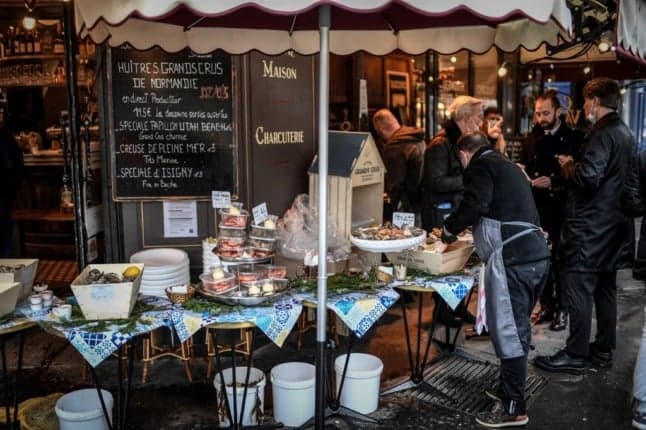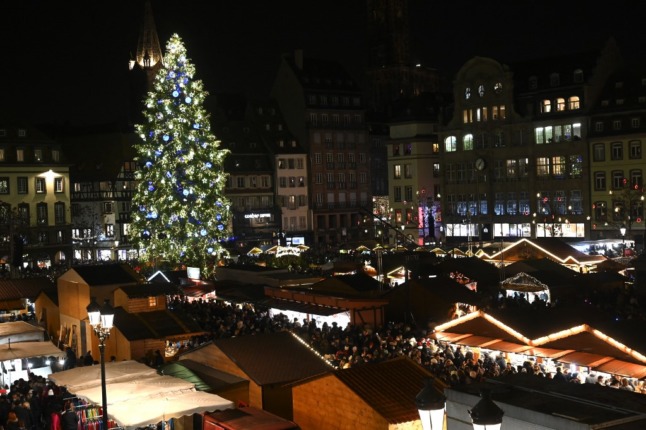5 things to know about a traditional French Christmas

From florists to oysters, whips to religion, here are five things to know about celebrating a traditional Christmas in France.
When
Both December 24th and 25th are important days in France, although only the 25th is a public holiday (and if it falls on a Saturday or Sunday then bad luck, there's no extra day off work).
The big Christmas seafood feast (more on that below) is traditionally held on the 24th while most families also exchange presents on this day. The 25th usually involves visiting relatives for lunch.
December 26th, known as Boxing Day in the UK, is not a thing in France and if it falls on a weekday then most people will be back at work.
Virtually all shops and many offices are open on the 24th, while the 26th is a normal working day (unless it falls on a Sunday).
On the 25th most shops close - although boulangeries, patisseries and florists (so you can pick up flowers or a plant for your hostess at lunch) often open in the mornings. In cities, public transport usually runs at least some services, if not a full schedule.
Presents
Presents are exchanged among friends and families, although the festival is slightly less of a consumerist nirvana than in anglophone countries. Within families present-giving often centres on children, with adults swapping smaller gifts.
Père Noël visits and leaves presents for the well-behaved children - and in certain parts of the country Père Fouettard (Father Flogger) visits naughty children with his whip, which may explain why French children tend to be quite well-behaved.
Watch out, too, for the Santons de Provence in Christmas markets. These are small hand-painted clay figurines that depict the people of Provence, in traditional costumes and carrying humble offerings, on their way to the Nativity. Sometimes, humorous or topical additions are made - in 2019, one santon-maker added a Yellow Vest protester. They are used to decorate festive cribs at home, or watch over gifts at the foot of the Christmas tree.
Food
Obviously all good festivals centre on food and France has its own traditions.
The big feast in France centres on seafood and families devour huge platters of shellfish including prawns, lobsters, crabs, whelks and - the Christmas king - oysters.
READ ALSO Why do the French eat so much seafood at Christmas?

Christmas trees in Strasbourg. Photo by FREDERICK FLORIN / AFP
Traditionally this meal is eaten on the evening of December 24th or sometimes the early hours of the 25th, after everyone has returned from Midnight Mass.
On the 25th the lunch often involves a roast bird - duck and goose is popular, as is guinea fowl and turkey. This isn't a strictly observed ritual though, and many families have their own food traditions for this day.
The usual Christmas desert is a Bûche du Noël (Christmas log) which is a chocolate or chestnut roulade with festive decorations. It's often served with exotic fruits and you will see lots of pineapples and lychées in the shops at this time of year.
Often served as a starter or canapé over the festive period is foie gras, and it's usually included in the hampers that older people get from their local mayor.
If you're in Provence, you will also get to experience the '12 desserts of Christmas'.
Religion
France is famously a secular republic and Christmas is - obviously - a Christian festival, so how to these two things square?
There are some nods to laïcité during the Christmas period - Christmas cribs are not allowed in public buildings such as town halls, and if your kids are in a French school you won't be forced to go and watch them put on a nativity play - but in general it's just celebrated as a festival that everyone enjoys.
READ ALSO What exactly does laïcité (secularism) mean in France?
So mayors erect Christmas trees (apart from some refusenik Green officials), mairies sport non-religious decorations including festive lights and politicians wish all their constituents a very happy Christmas.
Afterwards
Once Christmas itself is over there is still New Year to look forward to. Although this isn't such a wild party/drinking session as in some countries it is still celebrated and usually most towns put on a spectacular firework display as the clock strikes midnight.
READ ALSO The health rules and official advice for Christmas and New Year in France
And once that is over there's still one thing to look forward to - Epiphany on January 6th which involves a special cake with a crown.
Comments (1)
See Also
When
Both December 24th and 25th are important days in France, although only the 25th is a public holiday (and if it falls on a Saturday or Sunday then bad luck, there's no extra day off work).
The big Christmas seafood feast (more on that below) is traditionally held on the 24th while most families also exchange presents on this day. The 25th usually involves visiting relatives for lunch.
December 26th, known as Boxing Day in the UK, is not a thing in France and if it falls on a weekday then most people will be back at work.
Virtually all shops and many offices are open on the 24th, while the 26th is a normal working day (unless it falls on a Sunday).
On the 25th most shops close - although boulangeries, patisseries and florists (so you can pick up flowers or a plant for your hostess at lunch) often open in the mornings. In cities, public transport usually runs at least some services, if not a full schedule.
Presents
Presents are exchanged among friends and families, although the festival is slightly less of a consumerist nirvana than in anglophone countries. Within families present-giving often centres on children, with adults swapping smaller gifts.
Père Noël visits and leaves presents for the well-behaved children - and in certain parts of the country Père Fouettard (Father Flogger) visits naughty children with his whip, which may explain why French children tend to be quite well-behaved.
Watch out, too, for the Santons de Provence in Christmas markets. These are small hand-painted clay figurines that depict the people of Provence, in traditional costumes and carrying humble offerings, on their way to the Nativity. Sometimes, humorous or topical additions are made - in 2019, one santon-maker added a Yellow Vest protester. They are used to decorate festive cribs at home, or watch over gifts at the foot of the Christmas tree.
Food
Obviously all good festivals centre on food and France has its own traditions.
The big feast in France centres on seafood and families devour huge platters of shellfish including prawns, lobsters, crabs, whelks and - the Christmas king - oysters.
READ ALSO Why do the French eat so much seafood at Christmas?

Traditionally this meal is eaten on the evening of December 24th or sometimes the early hours of the 25th, after everyone has returned from Midnight Mass.
On the 25th the lunch often involves a roast bird - duck and goose is popular, as is guinea fowl and turkey. This isn't a strictly observed ritual though, and many families have their own food traditions for this day.
The usual Christmas desert is a Bûche du Noël (Christmas log) which is a chocolate or chestnut roulade with festive decorations. It's often served with exotic fruits and you will see lots of pineapples and lychées in the shops at this time of year.
Often served as a starter or canapé over the festive period is foie gras, and it's usually included in the hampers that older people get from their local mayor.
If you're in Provence, you will also get to experience the '12 desserts of Christmas'.
Religion
France is famously a secular republic and Christmas is - obviously - a Christian festival, so how to these two things square?
There are some nods to laïcité during the Christmas period - Christmas cribs are not allowed in public buildings such as town halls, and if your kids are in a French school you won't be forced to go and watch them put on a nativity play - but in general it's just celebrated as a festival that everyone enjoys.
READ ALSO What exactly does laïcité (secularism) mean in France?
So mayors erect Christmas trees (apart from some refusenik Green officials), mairies sport non-religious decorations including festive lights and politicians wish all their constituents a very happy Christmas.
Afterwards
Once Christmas itself is over there is still New Year to look forward to. Although this isn't such a wild party/drinking session as in some countries it is still celebrated and usually most towns put on a spectacular firework display as the clock strikes midnight.
READ ALSO The health rules and official advice for Christmas and New Year in France
And once that is over there's still one thing to look forward to - Epiphany on January 6th which involves a special cake with a crown.
Join the conversation in our comments section below. Share your own views and experience and if you have a question or suggestion for our journalists then email us at [email protected].
Please keep comments civil, constructive and on topic – and make sure to read our terms of use before getting involved.
Please log in here to leave a comment.